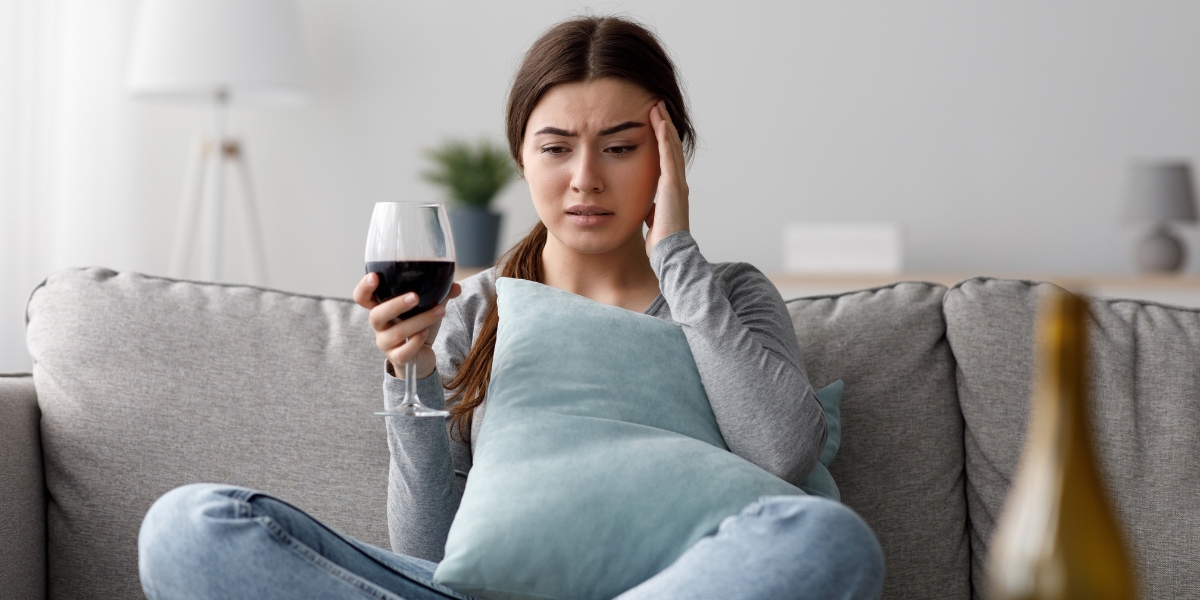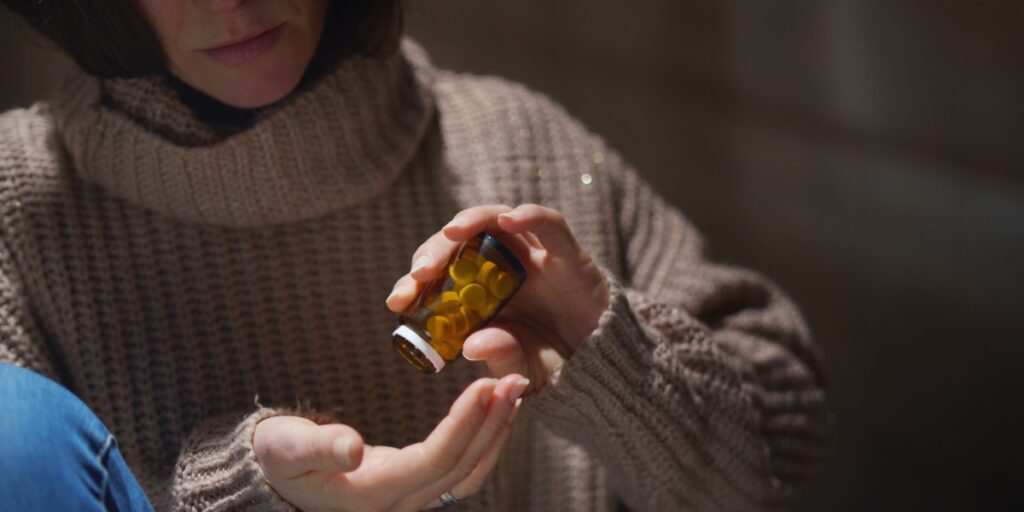Self-Medication with Alcohol and Drugs

At some point in many adult lives, people unknowingly turn to drugs or alcohol to make themselves feel better. For example, having a drink before a social event to relax or winding down with alcohol after a tiring day.
“Self-medicating” has become a casual word for anything that comforts a person, such as food, exercise, alcohol, drugs, or home remedies. However, it’s important to remember that taking care of oneself using available resources may not always be healthy or safe.
In mental health, many people have grappled with conditions including depression and anxiety disorders since their early years. Regrettably, many remain unaware of alternative coping mechanisms— instead, some resort to alcohol and drugs, using observed behaviors to self-medicate.
Understanding the risks of using substances to manage mental health concerns or chronic pain is important. Repeated misuse can build up to addiction, profound health complications, and, in the most tragic cases, even death. The consequences of self-medication are huge public health issues.
What Is Self-Medication?
Self-medication means treating yourself without consulting a doctor. It means using home remedies, purchasing over-the-counter medications, or taking supplements to address a physical or mental health problem.
Many individuals who self-medicate for mental health issues never get an official diagnosis. Some individuals have self-identified their issues, while others use available options to alleviate their distress without labeling the underlying cause. Individuals diagnosed with a medical condition may encounter difficulties in obtaining or affording the appropriate medication. As a result, they resort to self-treatment.
Self-medication involves the misuse of prescription drugs. This can include taking more anti-anxiety medication than prescribed or combining them with alcohol to enhance their effects.
According to the National Institute on Drug Abuse (NIDA), stress leads to self-medication and relapse into substance use. This can happen even after a person has been sober for a period of time. When you keep using substances to cope, it raises the chances of developing a substance addiction.
There are several common risks associated with self-medication:
- Worsening mental health and physical conditions
Self-medicating can harm mental and physical health as it may not address or worsen underlying problems.
- Increasing tolerance to alcohol and drugs
Drinking or using drugs frequently can lead to tolerance, requiring higher doses to achieve the desired effect.
- Developing a substance or alcohol use disorder
Self-medication can lead to addiction, where individuals depend on these substances to function or cope with daily life.
- Developing co-occurring conditions
Self-medication can lead to having both a mental health disorder and a substance use disorder simultaneously.
- Dangerous alcohol and drug interactions and side effects
Mixing self-medicated substances with other medications, alcohol, or drugs can lead to harmful interactions and adverse side effects.
- Resistance to other prescription medications
Prolonged self-medication may reduce effectiveness or resistance to other prescribed medications, making it challenging to find appropriate treatment options.
- Lower quality of life
Self-medication can harm relationships, work, and well-being, reducing the quality of life.
- Reluctance to seek professional treatment due to stigma or fear
People who self-medicate may avoid seeking professional help due to concerns about others’ opinions and potential negative outcomes. They may worry that others will judge them or that they will face negative consequences. This fear of judgment and potential harm can cause them to avoid seeking the help they need.

Signs of Self-Medicating
People self-medicate in various ways. They may eat for comfort, drink alcohol at parties, or borrow pain pills from friends. This is instead of seeking medical attention for minor injuries. However, frequent self-medication can escalate the risk of addiction and lead to severe consequences.
The signs of self-medication may not be immediately apparent, but they tend to become more noticeable over time. Here are some indicators of self-medication:
- Turning to alcohol and drugs as a means to cope with stress
- Frequently combining substances to experience more potent effects
- Experiencing heightened symptoms once the temporary effects of self-medication wear off
- Feeling unable to function without relying on self-medication
- Experiencing anxiety when unable to use alcohol or drugs immediately
- Problems related to self-medication habits
- Receiving comments from others about your substance abuse
- Lying about the type and quantity of substances you consume
- Neglecting personal hygiene
- Suffering strained relationships due to self-medication habits
- Requiring larger amounts of self-medication to achieve desired effects
- Feeling guilt or shame regarding your self-medication practices
- A decline in mental health
- Involvement in illegal activities to obtain medication or as a consequence of being under the influence
- An inability to stop using alcohol or drugs despite wanting to
Please remember that seeking assistance from qualified healthcare professionals is vital for effectively addressing addiction and self-medication concerns.
Self-Medicating Depression and Anxiety
It’s common for people to have both depression and anxiety at the same time, which means they have two conditions together. When symptoms get strong, people often try self-medication to feel better and return to their usual activities.
Figuring out these medical conditions can be tricky because it’s unclear if the depression and anxiety are caused by stopping alcohol and drugs or if they’re connected to other mental health issues like post-traumatic stress disorder (PTSD) or bipolar disorder.
People with mood disorders often turn to alcohol as their primary way of coping with the symptoms. They might also use medicines called benzodiazepines that help them feel calm. But even though these self-medication methods might make them feel better for a while, they affect the same brain chemicals contributing to depressive episodes. It creates a harmful cycle that keeps going.
Depression, anxiety, and substance use disorders are chronic conditions requiring ongoing professional assistance to effectively manage and lead a fulfilling life. Medical professionals use dual diagnosis to address substance use and co-occurring disorders while teaching healthy coping mechanisms.
It’s important to seek assistance from qualified healthcare providers. They can support and guide you in managing complex conditions. They can also help improve your overall well-being.

Addiction vs. Self-Medication
Self-medication is when people try to handle the symptoms and situations related to their physical and mental health conditions by themselves. However, addiction takes control over a person and can be very powerful. Self-medication can lead to developing addictive behaviors. Nevertheless, it’s crucial to recognize that depending on self-medication isn’t a successful approach to overcoming addiction.
A lot of people resort to self-medication as they haven’t sought professional help for their persistent pain or mental health problems. Once the root causes of their addiction are addressed, they no longer rely on alcohol or drugs as coping mechanisms.
Some people who started self-medicating became addicted and can’t stop using alcohol or medication without proper addiction treatment. Please note that seeking professional help from qualified healthcare providers is crucial for effectively addressing addiction and self-medication concerns.
How to Stop Self-Medicating with Drugs and Alcohol
If you or someone you care about is struggling with overcoming self-medication using drugs and alcohol and suffering from mental health problems, help is available.
At Northridge Addiction Treatment Center (NATC), we are dedicated to addressing all aspects of your addiction and providing personalized care tailored to your needs. We provide evidence-based treatments surrounded by compassion.
Our program helps you safely go through withdrawal with 24/7 medical supervision and support in a private and comfortable facility. We prioritize creating a nurturing and healing environment where you can confidentially embark on your recovery journey.
Our caring admissions specialists are ready to assist you and answer any questions you may have regarding your treatment options. Contact us today to take the first step towards a new life rooted in recovery.
Find Meaningful Recovery
Our caring and compassionate specialists are eager to help you comfortably navigate this journey to recovery. Our individualized treatment plan, programs, and therapies may be a perfect match for you or your loved one. Let us assist you in living the happy life you deserve. It starts with a phone call.




